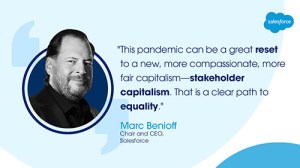Amid the devastating effects of the COVID-19 pandemic, we have a powerful opportunity to break with the past and shape a values-led future.
How do individuals, businesses, and governments prepare for a post-COVID-19 future where nothing is as it once was?
As potential vaccines allow us to imagine a light at the end of the COVID-19 tunnel, it is more important than ever for individuals, businesses, and countries to make decisions and set actions around values that will drive future behaviours. This was the overarching message from Singapore’s Senior Minister and Coordinating Minister for Social Policies, Tharman Shanmugaratnam, and Salesforce Chair and CEO Marc Benioff at the recent SG Tech Forum.
“Speaking of Singapore, our future is to be a hub – a hub for talent, local and foreign, a hub that’s connected to the rest of the world as efficiently as possible,” Mr Shanmugaratnam said. “Also a hub…which is predictable, reliable, and resilient.”
Such hubs are going to be a vital part of the smooth running of the reconfigured, globalised economy, Mr Shanmugaratnam said. But in this new reality, they require a special ingredient – a clear value set.
“We have to avoid thinking about economic objectives as somehow separate from social objectives,” he said. “They either inflict damage on each other, or they reinforce each other. If we’re able to run a competitive and efficient economy, we’re able to create a lot more opportunities for people.”
Mr Shanmugaratnam and Mr Benioff outlined the value-based decisions and considerations that must be made by individuals, organisations, and nations, to make the most of the powerful opportunities handed to us by the pandemic.
Compassionate capitalism
Business will not continue to be all about money, Mr Benioff told us. It will not be focused purely on shareholder returns.
“It is about a much greater mission than that,” he said. “What is required is a ‘new capitalism’ – a compassionate capitalism that is equitable, environmentally sensitive, and human.”
“At Salesforce, we put 1% of our equity, 1% of our profit and 1% of all of our employees’ time into a foundation the day we started,” Mr Benioff said. “We have delivered hundreds of millions of dollars to philanthropy and grants, and delivered five million hours of volunteerism.”
People investing in people
A major differentiator between nations during the pandemic, Mr Shanmugaratnam said, is whether people believe in the public good.
“It’s turning out to be quite an important differentiator,” he said. “If you think that wearing a mask, or respecting the norms required to keep COVID-19 at bay, are just about your individual rights or preferences then everyone is going to be worse off, including yourself.”
The nations that have the virus under control are those in which everybody is working towards the same strategic goal, and so they succeed. As a result, they all benefit.
Along those same lines “a big differentiator going forward is going to be where the companies and ecosystems of companies treat investing in their people as a responsibility,” Mr Shanmugaratnam said.
Do it well and the company will be more successful. The real power for the nation, however, is if every company does it.
“If everyone does the responsible thing, you find that skills will keep moving up and we achieve a more inclusive society,” he said. “That’s what we’re trying to do in Singapore.”
Aligning values with operations
“We have to choose our values as countries, as companies, and as individuals,” Mr Benioff said. “Then, how do we operationalise our values?
If values are discussed but never operationalised, they will never become reality. That’s the heart of our culture at Salesforce, how we get alignment, communication, awareness. We have to be conscious of our core values.”
This pandemic, Mr Benioff said, can be “the great reset to a new, more compassionate, more fair capitalism–stakeholder capitalism.”
All it requires is for businesses to activate their values, rather than simply discuss them, he said.
Good business collaborates with good government
One of the benefits businesses in Singapore have over other nations is strong government, Mr Benioff said.
“Having a government that can manage during a crisis, this is valuable,” he said. “Singapore has benefited from having a phenomenal government.”
Just as important, Mr Shanmugaratnam said, is collaboration between the public and private sectors. This means leading companies find ways to invest in small and medium-sized businesses (SMBs) up and down their supply chains, to help all businesses move upwards.
For example, the Salesforce Small Business Relief Grants Programme is a partnership with the Singapore Business Federation that helps SMBs to recover from the COVID-19 pandemic and return to growth.
“If everyone does that, and if you do it across industry clusters, you end up with a spiral that moves up,” Mr Shanmugaratnam said.
Success in the future will be defined by values-driven actions, rather than rhetoric. It will be about collaborative thinking and community-minded behaviours, rather than winning at all costs. It will come from a combination of the economic and the social, creating an exciting, more humanistic future that is enabled by great business.
























